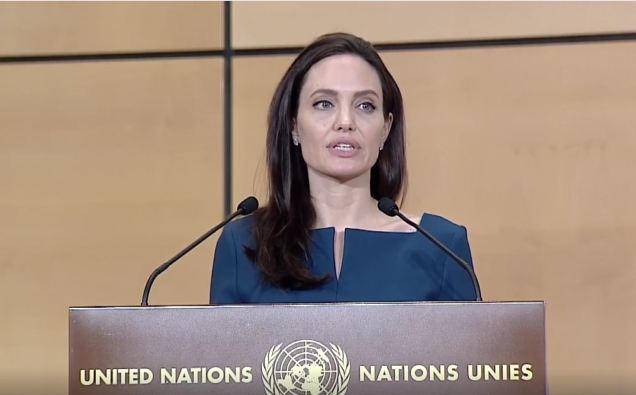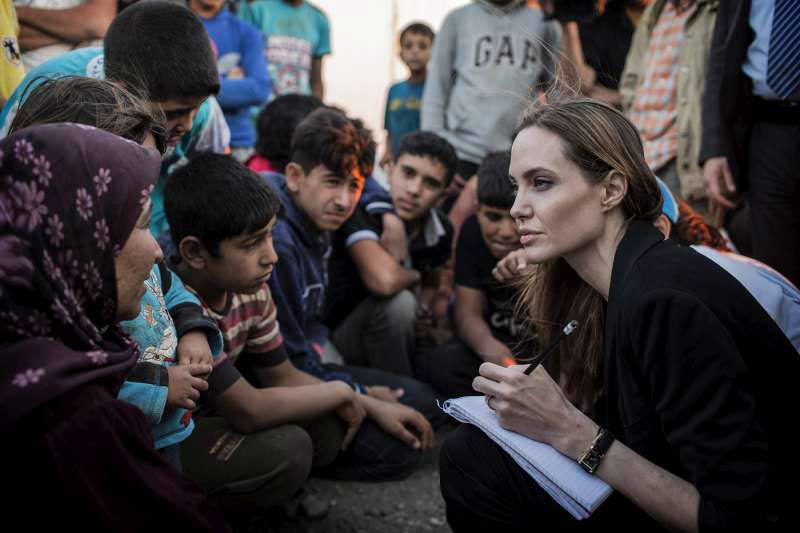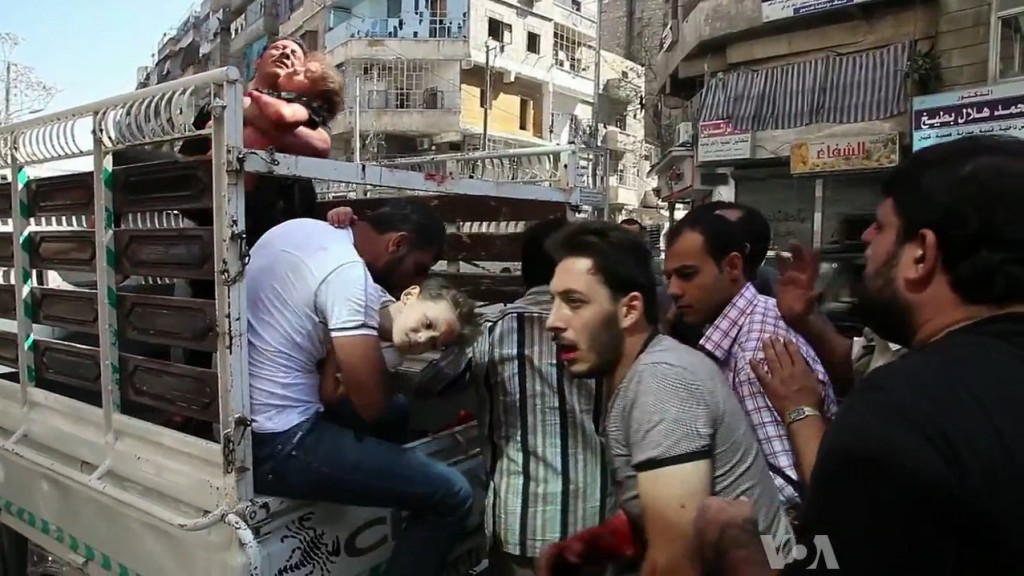
Amid world apathy towards refugees, UN Special Envoy for refugees agency Angelina Jolie has renewed her contract to serve in the position.
“I am with you for life,” she told the staff working for protection of refugees as the number of displaced people touches unprecdented proportions.
“This is like coming home. I was first here 16 years ago and had no idea what was ahead of me. I am sure many of you sometimes feel the same way,” she said, speaking at the office of the High Commissioner for Refugees.
Since the American actress affiliated herself with UNHCR, Jolie noted that the number of people driven from their homes by wars and persecution had surged to 65 million from 22 million, presenting a challenge to the world and in particular the UN Refugee Agency.
The world seems to be failing in its efforts to take care of thee refugees at a time when lasting solutions to the conflicts and regional, sectarian and international rivalries have kept peace and restoration of refugees elusive. A number of ongoing conflicts in countries including Syria, Iraq, Yemen, Libya, Sudan, famine and persecution elsewhere, have displaced millions of people.
“And, I know, many days you must feel, when you read the news, when you do your work, when you go into the field, ‘are we doing enough? Will we ever be able to do enough? Will we ever be able to get on top of this situation?’”
Jolie also spoke at an event held to pay tribute to the memory of UNHCR’s Sergio Vieira de Mello and the 21 other men and women, most of them UN workers, who died with him in the bombing of the UN Headquarters in Baghdad in August 2003.
Here are some excerpts from her speech, during which she defended internationalism and advocated that a strong leader pursues both national security and human rights.
“But I also speak as a citizen of my country – the United States.
“I believe all of us who work with the UN preserve this duality. The United Nations is not a country, it is a place where we come together as nations and people to try to resolve our differences and unite in common action.
“As a citizen, I find myself looking out on a global environment that seems more troubling and uncertain than at any time in my lifetime. I imagine many of you may feel the same.
“We are grappling with a level of conflict and insecurity that seems to exceed our will and capabilities: with more refugees than ever before, and new wars erupting on top of existing conflicts, some already lasting decades.
“We see a rising tide of nationalism, masquerading as patriotism, and the re-emergence of policies encouraging fear and hatred of others.
“We see some politicians elected partly on the basis of dismissing international institutions and agreements, as if our countries have not benefited from cooperation, but actually been harmed by it.
“We hear some leaders talking as if some of our proudest achievements are in fact our biggest liabilities – whether it is the tradition of successfully integrating refugees into our societies, or the institutions and treaties we have built rooted in laws and human rights.
“We see nations that played a proud role in the founding of the International Criminal Court withdrawing from it, on the one hand, and on the other, we see arrest warrants for alleged war crimes issued but not implemented, and other crimes ignored altogether.
“We see a country like South Sudan ushered by the international community into independence, then largely abandoned – not by the UN agencies and NGOs – but effectively abandoned, without the massive support they needed to make a success of sovereignty.
“And we see resolutions and laws on the protection of civilians and the use of chemical weapons, for instance, flouted repeatedly, in some cases under the cover of Security Council vetoes, as in Syria.
“Many of these things are not new – but taken together – and in the absence of strong international leadership, they are deeply worrying.
“When we consider all this and more, as citizens, what is our answer?
“Do we, as some would encourage us to think, turn our backs on the world, and hope we can wait for storms to pass?
“Or do we strengthen our commitment to diplomacy and to the United Nations?
“I strongly believe there is only one choice, demanded by reason as well as by conscience, which is the hard work of diplomacy and negotiation and reform of the UN.
“This is not to say that that is any way an easy road. And there are reasons people feel insecure today.
“The level of conflict and lack of solutions combined with the fear of terrorism; the reality that globalization has bought vast benefits to some but worsened the lot of others; the sense of a disconnect between citizens and governments, or in some countries the lack of governance; the overall feeling that for all our gains in technology and connectedness, we are less in control of forces shaping our lives – all these factors and more have contributed to a sense of a world out of balance, and there are no easy answers.
“And despite the millions of people who have lifted themselves out of poverty in our lifetimes, the difference between the lives of those of us born in wealthy, democratic societies and those born into the slums and refugee camps of the world is a profound injustice. We see it and we know it to be wrong, at a simple human level. That inequality is contributing to instability, conflict and migration as well as to the sense that the international system serves the few at the expense of the many.
“But again, what is our answer, as citizens?
“Do we withdraw from the world where before we felt a responsibility to be part of solutions?
“I am a proud American and I am an internationalist.
“I believe anyone committed to human rights is an internationalist.
“It means seeing the world with a sense of fairness and humility, and recognizing our own humanity in the struggles of others.
“It stems from love of one’s country, but not at the expense of others – from patriotism, but not from narrow nationalism.
“It includes the view that success isn’t being better or greater than others, but finding your place in a world where others succeed too.
“And that a strong nation, like a strong person, helps others to rise up and be independent.
“It is the spirit that made possible the creation of the UN, out of the rubble and ruin and 60 million dead of World War Two; so that even before the task of defeating Nazism was complete, that generation of wartime leaders was forging the United Nations.
“If governments and leaders are not keeping that flame of internationalism alive today, then we as citizens must.
“The challenge is how to restore that sense of balance and hopefulness in our countries, while not sacrificing all we have learnt about the value and necessity of internationalism.
“Because a world in which we turn our back on our global responsibilities will be a world that produces greater insecurity, violence and danger for us and for our children.
“This is not a clash between idealism and realism.
“It is the recognition that there is no shortcut to peace and security, and no substitute for the long, painstaking effort to end conflicts, expand human rights and strengthen the rule of law.
“We have to challenge the idea that the strongest leaders are those most willing to dismiss human rights on the grounds of national interest. The strongest leaders are those who are capable of pursuing both.
“Having strong values and the will to act upon them doesn’t weaken our borders or our militaries – it is their essential foundation.
“None of this is to say that the UN is perfect. Of course, it is not.
“I have never met a field officer who has not railed against its shortcomings, as I imagine Sergio did in his darkest moments.
“He, like all of us, wanted a UN that was more decisive, less bureaucratic, and that lived up to its standards. But he never said it was pointless. He never threw in the towel.
“The UN is an imperfect organization because we are imperfect. It is not separate from us.”



















